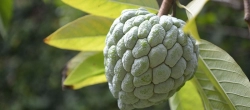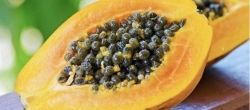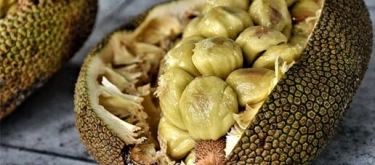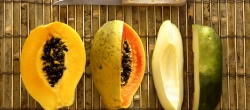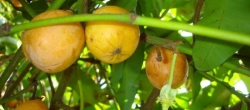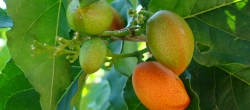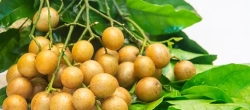Jackfruit: Taste Profile, Aroma, Benefits and Health Risks
Jackfruit, a large tropical fruit native to South and Southeast Asia, is known for its unique versatility. It’s often used as a meat substitute due to its dense, fibrous texture, making it popular in vegetarian and vegan cuisine. Jackfruit’s flavor varies significantly depending on its ripeness, adding either a sweet or savory element to dishes.
What does Jackfruit taste like?
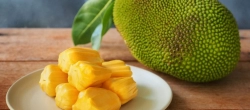
Primary Flavor Characteristics
Jackfruit’s flavor changes as it ripens. When young and unripe, it has a mild, neutral taste that takes on the flavors of seasonings in savory dishes, often compared to the texture of pulled pork or chicken. Ripe jackfruit, however, has a sweet, tropical flavor with hints of mango, banana, and pineapple.
Aromatic and Taste Nuances
Ripe jackfruit has a distinct, fruity aroma, sometimes described as a blend of bananas and pineapples, with a hint of floral sweetness. Its taste is creamy and sweet, with fibrous flesh that is tender and juicy. Unripe jackfruit has little to no fragrance, making it ideal for savory cooking.
Scientific Description of Taste and Aroma
- Aroma: Sweet and fruity when ripe, with hints of banana and pineapple; mild when unripe.
- Taste: Sweet, tropical, with a creamy texture when ripe; neutral and fibrous when unripe.
- Texture: Dense and fibrous, somewhat meaty when unripe; tender and juicy when ripe.
In-Depth Flavor Analysis of Jackfruit
Underlying Flavor Notes
Jackfruit’s flavor profile can include several layers:
- Tropical Sweetness: Ripe jackfruit is fruity and sweet, similar to a mix of mango and banana.
- Subtle Acidity: A mild tanginess in ripe jackfruit balances its sweetness, giving it a refreshing quality.
- Savory Adaptability: When unripe, jackfruit’s neutral taste and fibrous texture make it versatile for savory recipes.
Impact of Ripeness on Flavor
- Unripe Jackfruit: Firm, fibrous, and neutral in flavor; ideal for savory dishes where it mimics meat.
- Ripe Jackfruit: Soft, sweet, and fruity, with a creamy, juicy texture suitable for desserts or snacks.
- Overripe Jackfruit: Intensely sweet and soft, with a slight fermentation aroma that may be off-putting for some.
Textural Qualities
Jackfruit has a unique, fibrous texture that holds up well in cooking, particularly when used as a meat substitute. The flesh is dense and can be shredded, while the seeds add a creamy element when cooked.
Culinary Uses of Jackfruit
Primary Uses
- Meat Substitute: Unripe jackfruit’s fibrous texture makes it popular in vegan and vegetarian dishes, especially for pulled “pork” sandwiches, tacos, and curries.
- Fresh Eating: Ripe jackfruit can be enjoyed fresh, providing a tropical, sweet flavor.
- Desserts and Smoothies: Ripe jackfruit is used in tropical desserts, smoothies, and ice creams for its creamy, fruity taste.
- Curries and Stews: Jackfruit absorbs flavors well, making it an excellent addition to savory curries and stews.
- Chips and Snacks: Jackfruit can be dried or roasted to create chips or crunchy snacks, offering a sweet and nutritious option.
Ideal Pairings for Jackfruit
- Spices: Turmeric, cumin, and chili enhance jackfruit’s savory applications, adding warmth and depth.
- Coconut: Coconut milk complements jackfruit’s tropical sweetness in curries and desserts.
- Citrus Fruits: Lime and lemon add a bright contrast to jackfruit’s flavor in salads and salsas.
- Sweeteners: Honey, brown sugar, or maple syrup enhance the natural sweetness of ripe jackfruit in desserts.
- Herbs: Mint and cilantro add freshness to jackfruit’s fruity notes in tropical salads.
Health Benefits of Jackfruit
Key Nutrients and Benefits
- High in Vitamin C: Jackfruit is a good source of vitamin C, supporting immune health and skin vitality.
- Fiber-Rich: The fiber content in jackfruit supports digestion and helps maintain a healthy gut.
- Antioxidants: Jackfruit contains flavonoids and carotenoids that help reduce oxidative stress and protect cells.
- Low in Fat: Naturally low in fat, jackfruit is a heart-healthy option for those looking to reduce saturated fats.
- Rich in Potassium and Magnesium: These minerals help regulate blood pressure and support muscle and nerve function.
Potential Precautions
- High Natural Sugars: Ripe jackfruit is high in natural sugars, so moderation is advised for those monitoring blood sugar.
- Latex Sensitivity: People sensitive to latex may react to jackfruit; consult with a healthcare provider if you have a latex allergy.
- Unusual Smell When Overripe: Overripe jackfruit has a strong aroma that may not appeal to everyone.
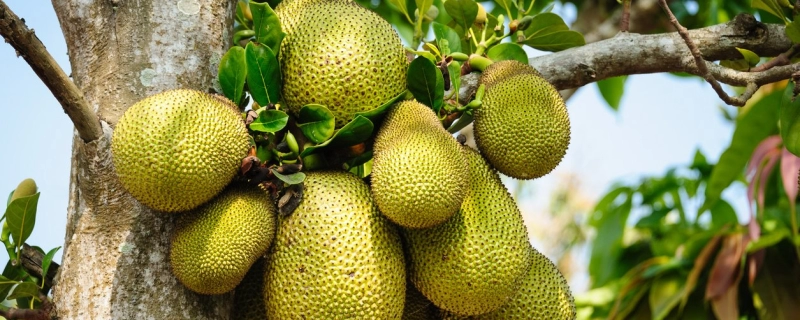
Tips for Choosing and Storing Jackfruit
How to Choose Quality Jackfruit
- Color and Firmness: Ripe jackfruit should have a yellow to brownish color with slight give when pressed. Unripe jackfruit is green and firmer.
- Aroma: A sweet, fruity aroma indicates ripeness; unripe jackfruit has little to no smell.
Storage Recommendations
- At Room Temperature: Store whole, unripe jackfruit at room temperature to allow it to ripen.
- Refrigeration: Ripe jackfruit can be stored in the refrigerator for up to a week, or the flesh can be frozen for several months.
Fun Facts About Jackfruit
- Largest Tree-Borne Fruit: Jackfruit holds the title as the largest fruit that grows on trees, with some weighing up to 80 pounds.
- Natural Meat Substitute: Due to its fibrous texture, unripe jackfruit has gained popularity as a plant-based meat alternative.
- High in Vitamins: Jackfruit is rich in vitamins and minerals, particularly vitamin C and potassium, making it highly nutritious.

